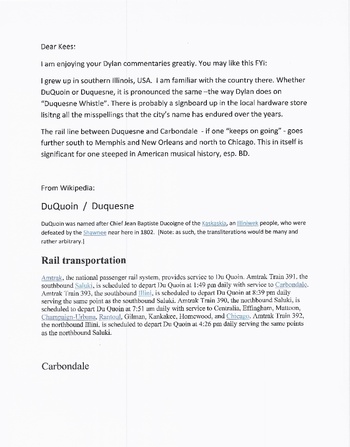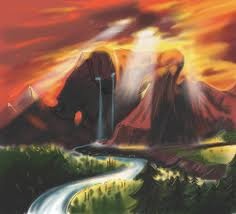
‘Duquesne Whistle’ – lyric analysis – by Kees de Graaf
‘Duquesne Whistle’ the first song on Dylan’s new album ‘Tempest’- a co-write with Robert Hunter - is yet another masterpiece. This song is really amazing; there are many thoughtful layers in it. When you listen for the first time, the feel the lyrics of the song may evoke comes close to the song ‘Highlands’ from ‘Time out of Mind’. But there is a difference. ‘Highlands’ was a metaphor for heaven. Highlands portrays the mental attitude of the poet towards those Highlands. His heart is in the Highlands. At the same time it is a journey to the Highlands. It is a learning process. At the end of the song it is as if he already reached his destination: ‘I’m already there in my mind’. In this song the poet waits for and focusses on the final whistle which can be blown at any minute; this whistle when it comes proclaims that the end of times has begun and that there is no turning back. This whistle has a warning for us in store, like in the song ‘Sugar Baby’: ‘Look up, look up—seek your Maker—’fore Gabriel blows his horn’ or in this case his whistle. There can be no doubt: death is calling at the poet’s door, he is about to cross the borderline. Sometimes it looks as if he is already on the other side; he is in and out of the train bound for glory. It is a song depicting human mortality and vulnerability, yet hope is close by. Let’s take a more detailed look at the song to see how this works out.
‘Listen to that Duquesne whistle blowing
Blowing like it’s gonna sweep my world away
I’m gonna stop at Carbondale, keep on going
That Duquesne train gonna ride me night and day’.
There is a place called Duquesne and Carbondale in Pennsylvania (PA), but the problem is that Dylan speaks of a ‘Duquesne train’ but these two towns appear not to have a train station. There is however a place called Carbondale in the south of Illinois which does have a train station. Carbondale is on the "City of New Orleans" train route which also passes through and stops in a town called DU QUOIN, IL, which is just north of Carbondale. This also raises a question. Dylan spells ‘Duquesne’ instead of ‘Du Quoin’ which is what one might expect here. But there appears to be no Duquesne in the state of Illinois. Although a press report in the New York Times of November 1921 reported from Duquesne (IL) that a train was hit by lightning just south of Pinckneyville, we found no evidence that there is Duquesne in Illinois and certainly not a Duquesne where there is a train station. Therefore, the question why Dylan chose to spell ‘Duquesne’ instead of Du Quoin is still open. Some resolve this issue by stating that ‘Duquesne’’ in Pennsylvania is meant here. The song is supposed to deal with the “Duquesne Works” steel mill, home to “Dorothy Six”, the largest blast furnace in the world. The Works, located in the Pennsylvania steel town of Duquesne, was once part of the Carnegie Steel Company. Dylan seems to have been inspired for this song by an article, “Business & Finance: Whistle”, TIME Magazine (Monday, June 26, 1933):– “Pennsylvania steel town, twelve miles up the Monongahela River from Pittsburgh. For two years its 21,000 inhabitants watched the tires die in the blast furnaces one by one. Then for two more years the furnaces were cold. Duquesne called it Depression. One day last week, Duquesne whistles shrieked, Duquesne bells clanged...”
The poet invites you to ‘Listen to that Duquesne whistle blowing’. When you are on a train station, a few seconds before the train starts moving, the station master blows a whistle. Of course there are more occasions and rules for a train whistle to blow. You can find these on: http://www.sdrm.org/faqs/rulebook/signals.html. In this whistle the poet hears that something important and irreversible is about to happen. A whistle is ‘blown’ – air is blown through the whistle and you hear a sound. When you think about air, about wind, your attention is drawn to the Hebrew word ‘ruach’ or the Greek word ‘pneuma’, which means ‘air’ ‘wind’. The Holy Spirit is like a wind, a ‘ruach’ or a ‘pneuma’, a sort of inspiration that pervades everything. In this Duquesne whistle the poet hears a voice from high, the Holy Spirit, calling, blowing, that the end is near, the poet has reached the end of the trail. The Spirit is ‘Blowing like it’s gonna sweep my world away’, when the poet dies, his world will suddenly come to an end, the present world is swept away and the poet is now going to enter an entirely new world.
When the poet says: ‘I’m gonna stop at Carbondale’, this may refer to a story told by an old record store owner who used to live in Carbondale. This record store owner is said to have said that the train which was struck by lightning in 1921 (see the reference to the New York Times above) would have gone through Carbondale, and that train would have brought many great blues and jazz musicians up from the south, who were on their way to Chicago. The train accident and the delay it apparently caused may be the reason why so many great musicians played in Carbondale.
Since the poet is a musician he’s gonna stop at Carbondale, but when at the same time he says ‘ keep on going, that Duquesne train gonna ride me night and day’, in some sort of a way he wants to make it clear that he is already on that train bound for glory, he is not going to leave that slow train which is picking up speed now, he is already on the other side of the fence.
‘You say I’m a gambler, you say I’m a pimp
But I ain’t neither one
Listen to that Duquesne whistle blowing
Sound like it's on a final run’.
‘You say I’m a gambler, you say I’m a pimp, but I ain’t neither one’. A gambler is a person who wagers money on the outcome of games or sporting events or someone who risks loss or injury in the hope of gain or excitement. A pimp is someone who procures customers for whores or arranges sexual partners for others. When the poet refutes these accusations by saying that he is neither a gambler nor a pimp, he wants to make it clear that – no matter how evasive he has been at times in expressing how he exactly feels about ‘God and man and law’ - he is not a person who ‘gambles for support’, a person who runs with the hares and hunts with the hounds, who makes the best of both worlds, ‘all those who have eyes and have ears’ mightknow exactly how he feels. He is not a gambler or a pimp, always ready for a sellout of faith, ideas or convictions. On the contrary, when he urges his audience to ‘Listen to that Duquesne whistle blowing, sounds like it's on a final run’, he feels that this time the whistle sounds as if it blows for the very last time. The train will leave and is on a final fun and will not come back; it is high time to get on board and although on other occasions he made it clear that even when you are in that train he ‘has a hard time believing if some people will ever arrive’, he is determined to get on board and to safely reach his destination and the whistle warns you’d better listen to that last whistle blowing before it’s too late.
‘Listen to that Duquesne whistle blowing
Blowing like she never blowed before
Blue light blinking, red light glowing
Blowing like she's at my chamber door’.
When he goes on to say ‘Listen to that Duquesne whistle blowing, blowing like she never blowed before’ he dwells on the same subject. This time he hears a different way of blowing, a way of blowing he never heard before, as if the whistle says: ‘I know your name, I know who you are,’ I’m gonna call you home to the place where you belong, to heaven’. ‘Blue light blinking’, in railway language a blue signal signifies that workmen are on, under, or between rolling equipment. The cover of the album ‘Slow Train Coming’ may give you a clue as to what this means. Although the train may be on the final run and the work is almost done, the railroad is at the same time still under construction. Time, on the other hand, is running out, because a ‘red light is glowing’, a red light means: STOP your way of living and think about it before it’s too late, all signals are on red, there is not much time left. This is intensified by the words: ‘Blowing like she's at my chamber door’. A chamber is a retired room, esp. an upper room used for sleeping. When the whistle is at his chamber’s door, it means that death will come soon and the poet is ready to meet God and may be called home any minute now.
‘You’re smiling through the fence at me
Just like you always smiled before
Listen to that Duquesne whistle blowing
Blowing like she ain't gon' blow no more’
The poet is just about to enter the place ‘that’s only one step down from here, it’s called the land of permanent bliss’. ‘You’re smiling through the fence at me just like you always smiled before’ may be God or Jesus welcoming him from the other side of the fence. In this smile there is heavenly peace, serenity and complacency as if God knows who he is and has always known him and that is why it says:’ just like you always smiled before’. Finally he is ready, just like he wrote in ‘Ain’t Talking’, to meet ‘All his loyal and much-loved companions, they approve of me and share my code’. ‘Blowing like she ain't gon' blow no more’ may mean that deep down inside he feels that this is the last time you can hear this whistle blow and he is just about to be called home.
‘Can't you hear that Duquesne whistle blowing?
Blowing like the sky's gonna blow apart
you’re the only thing alive that keeps me going
you’re like a time bomb in my heart’
This stanza takes us again to what will happen on the Latter Day. ‘Blowing like the sky's gonna blow apart’ makes you think of what Dylan wrote in ‘Things have changed’: ‘If the Bible is right the world will explode’. It reflects what is written in 2 Peter 3: 10: ‘But the day of the Lord will come like a thief, and then the heavens will pass away with a loud noise, and the elements will be dissolved with fire, and the earth and the works that are upon it will be burned up’. ‘You’re the only thing alive that keeps me going’ is basically the same thought as expressed in 'This dream of You' from the album ‘Together through Life’: ‘All I have and all I know is this dream of you which keeps me living on’. He knows that when the final whistle blows, Someone will be there to care for him. ‘You’re like a time bomb in my heart’ is a metaphor describing the fact that God has planted His seed in his heart. This time bomb in his heart waits for the final whistle to blow and will suddenly come to an explosion, a sudden change, in the twinkling of an eye. When this time bomb explodes at the set time – when the world explodes, it will be like Dylan wrote in the song: ‘Ye shall be changed’, ‘ye shall be changed, in a twinkling of an eye, when the last trumpet blows, the dead will arise and burst out of their clothes’
‘I can hear a sweet voice gently calling
Must be the mother of our LORD
Listen to that Duquesne whistle blowing
Blowing like my woman's on board’.
‘‘I can hear a sweet voice gently calling’ echoes ‘A Voice From On High’ which Bob used to sing with the Larry/Charlie band. "I hear a voice calling; it must be the Lord...."
The poet hears a voice gently or ‘steadily’ calling, welcoming him home and he feels and knows for sure that it cannot be anybody else but the mother of our LORD. The mother of our LORD Jesus is called Mary. The sweet voice of holy Virgin Mary, on behalf of Jesus, calls him home like he said in ‘Saving Grace’: ‘Wherever I’m welcome is where I’ll be’. This looks like a trait of Roman Catholicism. In the Roman Catholic tradition, Mary, the mother of our LORD Jesus acts like some sort of a mediatrix, a woman mediator between Jesus, God, and man. Although Dylan is not known to be associated to any church or denomination, we find this same Roman Catholic trait also in ‘Ain’t Talking’ from the album ‘Modern Times’ where it says: “They say prayer has the power to heal, so pray from the mother”. For a more details on this we refer to the analysis of 'Ain't Talking' - the Old Testament revisited' .
‘Blowing like my woman's on board’ seems to express that he has now come to terms with another feature in his works: his ambiguous attitude towards women. The woman, on the one hand the object of his desire and lust, distracting him from the road bound for glory, and on the other hand there is his quest for finding true love and partnership of a god fearing woman. Here on earth this tears him apart, but in eternity this ambiguity is straightened out. At the same time Dylan may use the word 'woman' here in the sense of a biblical metaphor. In the Bible the 'woman' or the 'bride' represents the church and Christ loves and cherishes the church just like a man loves a woman. Jesus speaks through the mouth of the poet and it is as if Jesus says: 'The struggle is over because my woman, the church, my bride is on board of the train, everything is ready for the eternal wedding which will be held very soon'.
‘Listen to that Duquesne whistle blowing
Blowing like it's gonna blow my blues away
You old rascal, I know exactly where you're going
I'll lead you there myself at the break of day’
As he hears the Duquesne whistle blowing, hope is glimmering through: ‘Blowing like it's gonna blow my blues away’, ‘the blues’ his sad melancholy mood is lifted like he expresses in ‘Highlands’’: ‘The sun is beginning to shine on me, but it’s not like the sun that used to be’. This time it is different, ‘the blues’, his sad, melancholy mood will not come back but will be blown away for good. ‘You old rascal, I know exactly where you're going’ seems inspired by an old song, at the intersection of Louis Armstrong and Bob Wills, the Hot Five with Earl Hines ( who was by the way born in Duquesne) and the Texas Playboys, where Louis Armstrong's ‘rascal’ is addressed directly: ‘I know exactly where you're going’. Dylan – as so often - gives the quote a different turn, and uses it for his own purposes in the song. ‘You old rascal’ looks like some sort of self-irony. It may be a sinner’s prayer, as if he is fully aware that his is still a sinner and that he is still in need of ‘saving grace’. It is as if he hears again ‘A Voice From On High’, it must be the voice of our Lord Jesus who addresses him directly: ‘You old rascal, I know exactly where you're going, I'll lead you there myself at the break of day’.The words ‘ I'll lead you there myself at the break of day’ are literally taken from Robert Fagles’ translation of Homer’s ‘The Odyssey’ – page 137. It is as if Jesus says: ‘I know you are a sinner, I know that you’re an old rascal, but I paid in blood for you, this time my own blood, and that is why ‘I know exactly where you’re going’, you’re my property and I’ll lead you there at the break of day, you’ll be with me forever when the dawn is breaking and the night is disappearing, when the deal goes down’’.
‘I wake up every morning with that woman in my bed
Everybody telling me she's gone to my head
Listen to that Duquesne whistle blowing
Blowing like it's gonna kill me dead’.
After the heavenly reflections of the previous verse, it looks like he is suddenly thrown back to the harsh earthly monotonous reality of everyday life.’ ‘I wake up every morning with that woman in my bed, everybody telling me she's gone to my head’ sounds condescendingly and shows the ambiguous attitude towards women we outlined earlier in this article. The feeling comes close to what Dylan wrote in ‘Rolling and Tumbling’: ‘Well, I did all I know just to keep you off my mind, well, I paid and I paid and my suffering heart is always on the line. I'm flat-out spent, this woman she been driving me to tears’ and shows the wretchedness of his earthly existence which is full of tears and strain, a burden which often seems heavier than he can bear and which sometimes goes to his head. ‘Blowing like it's gonna kill me dead’ is reminiscent of a line in another song on the album ‘Tempest’: ‘Pay in Blood’ where Dylan writes: ‘the more I die, the more I live’. On the one hand he hears in this whistle the agony and the pain of his earthly existence, this feels like ‘it’s gonna kill me dead’, on the other hand, the pain and the agony is at the same time a learning process which will lead to life in abundance.
‘Can't you hear that Duquesne whistle blowing
Blowing through another no-good town
The lights of my native land are glowing
I wonder if they'll know me next time round’.
This verse connects the past with the future. The running of the train in some sort of a way becomes timeless, covering both the present, the past and the future. In the wheels of time the train now runs through another ‘no good town’ while a whistle is blowing. Somebody pointed out to me that this verse and also the final verse should rather be spiritually understood as referring to Christ returning to his native land – Jerusalem in the land of Israel. For Jesus, such a ‘no good town’ may have been Jerusalem. Jesus now speaks through the mouth of the poet and it is clear that when Jesus was on earth that the city of Jerusalem did not do Him any good.( Somehow I feel an allusion here to ‘Things have changed’. Jesus is in the wrong town: ‘This place ain’t do me any good’. If Jesus would have had the ‘Hollywood’ mindset, they might have accepted and not have crucified Him). Israel and in particular Jerusalem was the place where He was rejected and ultimately crucified, that’s why it says: ‘Blowing through another no-good town’ .
At first glance it looks as if ‘The lights of my native land are glowing’ refers to the lights of the land where the poet was physically born, to his native town and to the sweet memories of his native land. In the same way ‘I wonder if they'll know me next time round’ would then refer to the fact that during his lifetime Dylan was never accepted the way that he was and he now expresses the wish that in the world to come his art will finally be recognized in its unique and true value. It reminds us of the 2004 CBS interview when Bradley said to Dylan: ‘It's ironic, that the way that people viewed you was just the polar opposite of the way you viewed yourself’. However, someone pointed out to me that such an interpretation makes no sense and lacks some kind of other underlying spiritual reality. Therefore, also here we have to consider that it looks as if Dylan has Jesus talk through his mouth saying: ‘The lights of my native land are glowing’ . Jesus ‘native land is of course the land of Israel and as the train passes by, it is as if Jesus sees the lights of this beautiful land flicker and Jesus wonders: ‘will they know me next time round’ . When Jesus says ‘I wonder if they'll know me next time round’ this should be seen from a human perspective as if Jesus wonders if they – the people of Jerusalem – will accept and acknowledge Him when He will come back and that will be on the Latter Day. We have to remember that Dylan may have had Jesus in mind when he wrote in ‘If you ever go to Houston’: ‘The same way that I leave here will be the way that I came’. Jesus incarnated and came from heaven to live in the land of Israel and went back to heaven from the land of Israel and will come back from heaven on the Latter Day. The only difference is that when he will return on the Latter day, every eye will see him, like it says in Revelation 1: 7: ‘Behold, he is coming with the clouds, and every eye will see him, everyone who pierced him’. So even if they do not want to recognize Him, they will be forced to recognize Him on that day.
‘I wonder if that old oak tree's still standing
That old oak tree, the one we used to climb
Listen to that Duquesne whistle blowing
Blowing like she's blowing right on time’.
On the face of it, also these final words dwell on the same thought. Sweet memories of the poet’s youth, of his boyhood, are connected to the Promised Land in the future. This passage is reminiscent of an old song called: ‘The green green grass of home’:
‘The old home town looks the same as I step down from the train,
The old house is still standing, though the paint is cracked and dry,
and there's that old oak tree that I used to play on’.
However, also in this verse there may be a much deeper layer. On the internet I read an interesting interpretation that the ‘tree’ which is mentioned here may be a metaphor for the cross on which Jesus was nailed. Although the Bible makes it clear that Jesus died on a cross made of wood, there is some biblical foundation for this metaphor because Galatians 3:13 says: ‘Christ redeemed us from the curse of the Law, having become a curse for us—for it is written, "Cursed is everyone who hangs on a tree.". So when it says: ‘I wonder if that old oak tree's still standing, that old oak tree, the one we used to climb’ this may be a reference to the cross at Cavalry and in this metaphor ‘to climb a tree’ would mean ‘to be nailed on the cross’. Now it is as if Jesus wonders if the cross on which he once died will still be there when He returns, in other words will they crucify me again when I return or will they finally accept me as Messiah. The ‘we’ in ‘the one we used to climb’ would refer to the thief on the cross and it is as if Jesus talks again to the thief on the cross, in the same way as the conversation between Jesus and the thief in Dylan’s classic work ‘All along the Watchtower’’.
This final scene heralds the end of time, when everything is said and done the final whistle is blown right on time. There is a time for everything, the whistle is ‘blowing like she’s blowing right on time '.
As always.... please respond to this article by pushing the button 'reacties' below.
![images[1].jpg images[1].jpg](/media/Image/thumbs/4609p17hrjs7l71tih1g1gjd61e8agn81.jpg)


![images[1].jpg images[1].jpg](/media/Image/thumbs/1389p17gfs12gsjpiojb0g151b3mk1.jpg)

![118-480x319[1].jpg 118-480x319[1].jpg](/media/Image/thumbs/4163p17e8gu5455m0uvlf8u1g775k51.jpg)



